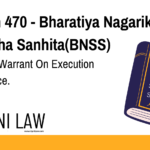Code
(1) The powers conferred by sections 473 and 474 upon the State Government to
remit or commute a sentence, in any case where the sentence is for an offence—
(a) which was investigated by any agency empowered to make investigation
into an offence under any Central Act other than this Sanhita; or
(b) which involved the misappropriation or destruction of, or damage to, any
property belonging to the Central Government; or
(c) which was committed by a person in the service of the Central Government
while acting or purporting to act in the discharge of his official duty,
shall not be exercised by the State Government except after concurrence with the Central
Government.
(2) No order of suspension, remission or commutation of sentences passed by the State
Government in relation to a person, who has been convicted of offences, some of which relate to
matters to which the executive power of the Union extends, and who has been sentenced to
separate terms of imprisonment which are to run concurrently, shall have effect unless an order
for the suspension, remission or commutation, as the case may be, of such sentences has also
been made by the Central Government in relation to the offences committed by such person
with regard to matters to which the executive power of the Union extends.
Explanation
Key Provisions:
- State Government Requires Central Government’s Concurrence:
- When the offence was investigated by a Central Agency under a Central Act.
- When the offence involved damage or misappropriation of Central Government property.
- When the offence was committed by a Central Government employee while on official duty.
- Concurrent Power in Cases of Multiple Convictions:
- If a person has been convicted of multiple offences, and some of them fall under Central Government jurisdiction, the State Government cannot reduce or alter the sentence unless the Central Government also agrees.
Illustration
Example 1: A Case Investigated by a Central Agency
A businessman is convicted of financial fraud in a case investigated by the Enforcement Directorate (ED) under the Prevention of Money Laundering Act (PMLA) (a Central Act).
- The State Government cannot remit or commute the sentence without approval from the Central Government under Section 477 BNSS.
Example 2: Damage to Central Government Property
A protestor is sentenced to imprisonment for setting fire to a Central Government office.
- The State Government cannot grant remission or commutation of the sentence unless the Central Government concurs.
Example 3: A Central Government Employee Convicted of a Crime
A CBI officer is convicted of corruption while on duty.
- The State Government cannot reduce or commute his sentence unless the Central Government agrees.
Example 4: A Person Convicted of Multiple Offences
A person is sentenced to five years in jail for a state-level offence and seven years for an offence under a Central law.
- The State Government cannot unilaterally reduce the sentence unless the Central Government also agrees to remission under Section 477(2) BNSS.
Common Questions and Answers
Q1: Why does the State Government need approval from the Central Government in some cases?
In cases involving Central Agencies, Central Property, or Central Government Employees, the Central Government has overriding jurisdiction, ensuring that state decisions do not conflict with national interests.
Q2: Can the Central Government overrule the State Government’s decision in such cases?
Yes, if the Central Government does not agree, the State Government cannot proceed with remission or commutation.
Q3: What happens if the State Government remits a sentence without Central Government approval?
If the State Government violates Section 477 BNSS, the remission or commutation will be legally invalid, and the convict will continue serving the original sentence.
Q4: Does this section apply to all cases of remission or commutation?
No, only in cases where the offence falls under Central jurisdiction due to:
- Investigation by a Central Agency
- Damage to Central Property
- Involvement of a Central Government Employee
Conclusion
Section 477 BNSS establishes a mandatory requirement for the State Government to obtain Central Government approval before remitting or commuting sentences in cases involving Central Agencies, Central Property, or Central Government Employees. This ensures that remission decisions do not conflict with national security, financial, or administrative interests and maintains a harmonious balance of power between the State and Central Governments in criminal justice matters.








